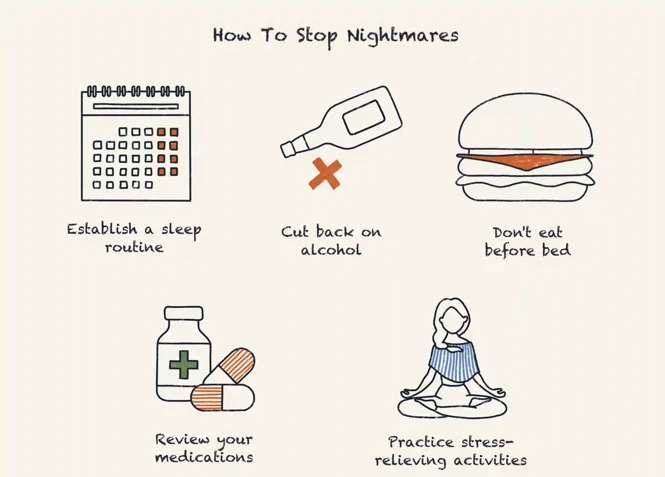Do you often wake up in the middle of the night, your heart pounding and covered in sweat, after experiencing a terrifying nightmare? Nightmares can interrupt your sleep, leaving you feeling exhausted and fearful. If you’re tired of being plagued by these unsettling dreams, you’ve come to the right place. In this article, we will explore various tips, techniques, and lifestyle changes that can help prevent nightmares and promote restful sleep. So let’s dive into the world of dreams and learn how to banish those nighttime frights for good.
Understanding Nightmares

Nightmares are unsettling dreams that can leave you feeling frightened, anxious, and even physically disturbed. They often occur during REM sleep, the stage of sleep associated with vivid dreaming. Definition of Nightmares vary from person to person, but they typically involve intense emotions, fear, and a sense of danger. While occasional nightmares are common, recurring nightmares can significantly disrupt your sleep and overall well-being. Understanding the causes of nightmares is crucial in finding effective ways to prevent them. Certain factors, such as stress, trauma, medication side effects, and sleep disorders, can contribute to the occurrence of nightmares. It’s important to differentiate nightmares from night terrors, which are intense episodes of fear that can cause physical symptoms like screaming and thrashing. By gaining insight into the causes and effects of nightmares, you can take proactive steps to diminish their impact on your sleep and mental health.
Definition of Nightmares
Nightmares are a type of disturbing dream that can cause intense feelings of fear, anxiety, or terror. They often occur during the rapid eye movement (REM) stage of sleep, which is when dreams are most vivid. Nightmares can evoke strong emotions and sensations, leading to increased heart rate, sweating, and even waking up in a state of panic. These dreams are characterized by their distressing content, which may involve scenarios of danger, death, monsters, or other threatening situations. While nightmares can affect people of all ages, children are particularly prone to experiencing them. It is important to note that nightmares are different from night terrors, which are sudden, intense episodes of fear that can cause physical and emotional distress. Understanding the definition of nightmares helps individuals recognize and differentiate them from other sleep disturbances, enabling them to seek appropriate coping strategies and treatments if necessary. To learn more about the causes, effects, and coping strategies for nightmares, you can visit this resource.
Causes of Nightmares
Nightmares can have various causes, ranging from daily life stressors to underlying health conditions. Understanding the potential triggers can help you identify the root cause and take necessary steps toward prevention. Here are some common causes of nightmares:
- Stress and Anxiety: High levels of stress, anxiety, or unresolved trauma can increase the likelihood of experiencing nightmares. These emotions can activate the brain’s fear response, leading to vivid and disturbing dreams. Finding healthy coping mechanisms and stress-reduction techniques can help alleviate the frequency and intensity of nightmares.
- Medication and Substance Use: Certain medications and substances can interfere with sleep patterns and trigger nightmares. For instance, antidepressants, beta-blockers, and medications that affect the central nervous system may have this side effect. If you suspect medication as the cause, discuss with your healthcare provider alternative options or strategies to manage the side effects. (Refer to Managing Nightmare Medications for more information)
- Sleep Disorders: Sleep disorders such as sleep apnea, insomnia, and narcolepsy can disrupt normal sleep cycles and increase the likelihood of experiencing nightmares. Treating the underlying sleep disorder can help improve sleep quality and reduce the occurrence of nightmares.
- Post-Traumatic Stress Disorder (PTSD): Individuals with PTSD may experience nightmares related to their traumatic experiences. Therapy and other supportive treatments can assist in processing the trauma and reducing the frequency and intensity of nightmares.
- Environmental Factors: External factors such as extreme temperatures, noise, or sleeping in an unfamiliar environment can contribute to nightmares. Creating a comfortable and soothing sleep environment can help minimize disturbances and promote better sleep. (Refer to Nightmares, Sleep Quality, and Mental Health for more information)
- Food and Diet: Consuming heavy meals, spicy foods, or certain medications close to bedtime can disrupt sleep patterns and increase the chances of experiencing nightmares. It’s advisable to have a light meal and avoid stimulants before sleep.
By identifying the potential causes of your nightmares, you can take appropriate measures to address them and create an environment conducive to peaceful and restful sleep. If you suspect an underlying condition or if your nightmares significantly impact your sleep and well-being, consulting with a healthcare professional can provide further guidance and support.
Tips for Avoiding Nightmares

Creating a relaxing bedtime routine is a crucial step in avoiding nightmares. Establishing a consistent routine, such as taking a warm bath, reading a book, or practicing gentle stretching exercises, can signal to your body and mind that it is time to unwind and prepare for sleep. It’s also important to avoid late-night snacks and stimulants like caffeine and nicotine, as these can disrupt your sleep patterns and increase the likelihood of experiencing nightmares. Keeping a dream journal can help you gain insight into your dreams and identify any patterns or triggers. By recording your dreams upon waking, you can reflect on them later and potentially uncover underlying emotions or stressors that may be influencing your nightmares. Additionally, practicing relaxation techniques such as deep breathing exercises and progressive muscle relaxation can help reduce anxiety and promote a more peaceful slumber. By incorporating these tips into your bedtime routine, you can take proactive measures to prevent nightmares and enjoy restful, uninterrupted sleep.
Create a Relaxing Bedtime Routine
Creating a relaxing bedtime routine is vital for promoting better sleep and reducing the likelihood of nightmares. Start by establishing a consistent sleep schedule and go to bed and wake up at the same time every day, even on weekends. This helps regulate your body’s internal clock and improves the quality of your sleep. Before bed, engage in calm and soothing activities to unwind. Consider taking a warm bath or shower to relax your muscles and prepare your body for sleep. Avoid stimulating activities or screens (such as smartphones or TVs) at least an hour before bed, as the blue light emitted by these devices can interfere with your sleep patterns. Instead, try reading a book, practicing gentle stretches, or listening to calming music. Creating a peaceful sleep environment is also crucial. Make sure your bedroom is dark, quiet, and at a comfortable temperature. Use blackout curtains, earplugs, or a white noise machine if necessary. Creating a relaxing ritual will signal to your brain that it’s time to unwind and prepare for a restful night’s sleep.
Avoid Late-Night Snacks and Stimulants
To promote restful sleep and reduce the likelihood of nightmares, it is advisable to avoid late-night snacks and stimulants. Consuming heavy or spicy foods close to bedtime can disrupt your digestive system, leading to discomfort that may interfere with your sleep. It’s best to eat a light, balanced meal a few hours before bedtime to allow for proper digestion. Additionally, stimulants such as caffeine and nicotine should be avoided in the evening. These substances can interfere with your ability to fall asleep and stay asleep, making you more vulnerable to nightmares. Caffeine, found in coffee, tea, soda, and chocolate, is a stimulant that can keep you alert and awake. Nicotine, commonly found in cigarettes and other tobacco products, can also induce restlessness and insomnia. Instead of relying on these stimulating substances, try opting for herbal teas that promote relaxation, such as chamomile or lavender. By avoiding late-night snacks and stimulants, you can create an environment conducive to peaceful sleep, reducing the chances of experiencing unsettling nightmares.
Keep a Dream Journal
Keeping a dream journal can be a helpful technique in preventing nightmares and understanding the patterns and themes within your dreams. When you wake up from a dream, grab a pen and notebook, or use a dream journal app on your smartphone, and write down everything you remember about the dream. Include details about the setting, people, objects, emotions, and any significant events. The process of recording your dreams helps to solidify them in your memory and allows you to reflect on their content later. By regularly reviewing your dream journal, you may start to notice recurring symbols, themes, or emotions that appear in your dreams. This self-awareness can provide valuable insights into your subconscious mind and help you identify any potential triggers for nightmares. Additionally, keeping a dream journal can enhance your overall dream recall, making it easier to remember and analyze your dreams over time. Remember to keep your dream journal near your bed, as dreams are most vivid and easily forgotten immediately upon waking. So, start keeping a dream journal today and unlock the mysteries of your dream world.
Practice Relaxation Techniques
Engaging in relaxation techniques can be an effective way to reduce stress and promote peaceful sleep, ultimately helping to prevent nightmares. Incorporate these practices into your daily routine:
- Deep Breathing: Take slow, deep breaths, focusing on inhaling and exhaling fully. This technique activates your body’s relaxation response, calming your mind and reducing anxiety.
- Progressive Muscle Relaxation: Start by tensing and then relaxing each muscle group in your body, from your toes to your head. This exercise helps release physical tension, promoting a sense of relaxation.
- Mindfulness Meditation: Practice being fully present in the moment, observing your thoughts and sensations without judgment. Mindfulness meditation can help cultivate a calm and centered state of mind, reducing stress and promoting better sleep.
- Aromatherapy: Incorporate soothing scents like lavender or chamomile into your bedtime routine. Whether through essential oils, candles, or diffusers, aromatherapy can create a calming atmosphere that promotes relaxation before sleep.
- Visualizations: Picture yourself in a serene and peaceful environment, such as a beach or a meadow. Engage your senses and imagine the sights, sounds, and sensations of that place, allowing yourself to unwind and let go of any tension.
By regularly practicing these relaxation techniques, you can reduce stress levels and create a tranquil mindset before sleep, minimizing the chances of experiencing nightmares.
Techniques to Reduce Anxiety

Anxiety can often be a triggering factor for nightmares, intensifying their frequency and intensity. To combat this, there are several techniques that can help reduce anxiety and promote a sense of calm before bedtime.
Deep breathing exercises can be incredibly effective in calming the mind and body. By focusing on slow, deep breaths, you can activate the body’s relaxation response, lowering heart rate and reducing tension. Another technique is progressive muscle relaxation, which involves systematically tensing and releasing different muscle groups to promote a state of relaxation. This method helps release built-up tension in the body, creating a sense of calmness. Mindfulness meditation is also a powerful technique that involves bringing your attention to the present moment, observing your thoughts and emotions without judgment. This practice cultivates a greater sense of awareness and can help reduce anxiety and stress. By incorporating these techniques into your daily routine, you can effectively manage anxiety and lessen the likelihood of experiencing distressing nightmares.
Deep Breathing Exercises
Deep breathing exercises are a simple yet powerful technique for reducing anxiety and promoting relaxation, making them an effective tool for preventing nightmares. By focusing on your breath, you can activate the body’s natural relaxation response and calm your mind. To practice deep breathing, find a comfortable position and begin by taking a slow, deep breath in through your nose. Feel your abdomen expand as you fill your lungs with air. Hold the breath for a few seconds and then exhale slowly through your mouth, letting go of any tension or stress. Repeat this process several times, allowing each breath to become slower and deeper. As you engage in deep breathing exercises, try to visualize inhaling peace and tranquility while exhaling any negative or anxious thoughts. You can enhance the effectiveness of deep breathing by incorporating positive affirmations or calming imagery into your practice. By incorporating deep breathing exercises into your daily routine, especially before bed, you can cultivate a sense of inner calmness and reduce the likelihood of experiencing nightmares.
Progressive Muscle Relaxation
Progressive Muscle Relaxation is a technique that can help reduce anxiety and promote relaxation, making it an effective tool for preventing nightmares. This technique involves systematically tensing and then relaxing each muscle group in your body, helping to release tension and promote a state of calm. To practice Progressive Muscle Relaxation, find a quiet and comfortable space where you can lie down or sit in a relaxed position. Begin by focusing on your breath, taking slow, deep breaths in and out. Starting with your toes, tense the muscles in that area for a few seconds before releasing and allowing them to fully relax. Move up to your calves, thighs, and progressively work through each muscle group, including your arms, shoulders, and face. As you tense and release each muscle group, pay attention to the sensations of tension and relaxation. This technique helps your body become more aware of the difference between tension and relaxation, ultimately promoting a sense of physical and mental relaxation.
Mindfulness Meditation
Mindfulness meditation is a powerful technique that can help reduce anxiety and promote better sleep. By practicing mindfulness, you can learn to focus your attention on the present moment and cultivate a mindset of non-judgment and acceptance. Here are some techniques and tips to incorporate mindfulness meditation into your nightly routine:
1. Find a quiet and comfortable space: Create a peaceful environment for your meditation practice. Find a quiet room where you won’t be disturbed and choose a comfortable sitting position.
2. Set a timer: To start, set a timer for a short duration, such as 5-10 minutes. As you become more comfortable with the practice, you can gradually increase the duration.
3. Focus on your breath: Pay attention to your breath as you inhale and exhale. Notice the sensation of the breath entering and leaving your body. If your mind wanders, gently bring your focus back to your breath.
4. Body scan technique: Once you’re settled into your meditation, bring your awareness to your body. Start from the top of your head and slowly move down, bringing attention to each part of your body. Notice any sensations or areas of tension and practice releasing them.
5. Notice your thoughts and emotions: During meditation, thoughts and emotions may arise. Instead of getting caught up in them, observe them with curiosity and without judgment. Acknowledge their presence and then let them go, returning your attention to your breath.
6. Practice gratitude: Incorporate gratitude into your mindfulness meditation practice. Take a moment to reflect on the things you’re grateful for in your life. This can help shift your focus towards positive emotions and foster a sense of calmness.
By regularly practicing mindfulness meditation, especially before bed, you can train your mind to let go of stress and worries, promoting a sense of relaxation and reducing the likelihood of experiencing nightmares. Remember, consistency is key in reaping the full benefits of this technique. So set aside some time each day to cultivate mindfulness and enjoy its positive effects on your sleep and well-being.
Environment and Sleep

Creating a peaceful sleep environment is essential for preventing nightmares and promoting quality sleep. One effective technique is to remove any distractions or sources of stress in your bedroom. Consider keeping your bedroom clean and clutter-free, as a disorganized space can contribute to anxiety and interfere with relaxation. Additionally, managing stress in your bedroom can greatly impact your sleep quality. Make sure your bedroom is a sanctuary for rest and relaxation by incorporating soothing colors, comfortable bedding, and calming scents. It’s also beneficial to avoid using electronics before bed, as the blue light emitted from screens can disrupt your sleep patterns. Instead, engage in relaxing activities such as reading a book or practicing some light stretching before dozing off. By optimizing your sleep environment, you can create a peaceful oasis that encourages restful sleep and helps ward off those pesky nightmares.
Create a Peaceful Sleep Environment
To create a peaceful sleep environment, it’s important to consider several factors that can contribute to a restful night’s sleep. Firstly, consider the lighting in your bedroom. Use soft, dim lighting in the evening to signal to your body that it’s time to wind down. Avoid bright overhead lights and opt for bedside lamps or nightlights instead. Additionally, ensure that your bedroom is quiet and free from disruptive noises. If outside noises are a problem, consider using earplugs or a white noise machine to create a peaceful ambiance. Another essential element of a peaceful sleep environment is maintaining a comfortable temperature. Keep your bedroom cool and well-ventilated to promote better sleep. Lastly, pay attention to your bedding and mattress. Choose a comfortable mattress and pillows that support your body, and use soft and breathable sheets and blankets. Creating a peaceful sleep environment can significantly improve the quality of your sleep and help prevent nightmares.
Manage Stress in Your Bedroom
One of the keys to ensuring a peaceful sleep environment is managing stress in your bedroom. Stress can greatly impact your ability to relax and fall asleep, making it important to create a space that promotes calmness and tranquility. Start by decluttering your bedroom and keeping it clean and organized. A cluttered space can contribute to feelings of anxiety and stress. Consider incorporating elements of nature, such as plants or a small indoor fountain, to create a soothing atmosphere. Utilize soft lighting, like dim lamps or candles, to create a cozy ambiance that encourages relaxation. Additionally, choose calming colors for your bedroom decor, such as soft blues or earth tones, to create a serene and tranquil environment. Invest in a comfortable mattress, pillows, and bedding to ensure maximum comfort during sleep. Finally, consider incorporating stress-relieving activities in your bedroom, such as reading, meditation, or gentle stretching exercises. By managing stress in your bedroom, you can create an environment that promotes relaxation and helps reduce the likelihood of nightmares disrupting your sleep.
Avoid Using Electronics Before Bed
Using electronics before bed can have a detrimental effect on your sleep quality and increase the likelihood of experiencing nightmares. The bright screens of smartphones, tablets, and laptops emit blue light, which suppresses the production of melatonin, a hormone that promotes sleep. When melatonin levels are disrupted, it can be more difficult to fall asleep and stay asleep throughout the night. Additionally, engaging with electronic devices before bed can stimulate your brain and make it harder to relax. The content you consume, such as social media, news, or intense videos, can also have a negative impact on your mental state, potentially leading to anxiety or stress. Instead of spending time on screens before bed, replace this habit with relaxing activities, such as reading a book, practicing a relaxation technique, or enjoying a warm bath. Disconnecting from electronics and allowing your mind to unwind will create a more peaceful environment for sleep, reducing the chances of experiencing nightmares.
Healthy Lifestyle Habits

Maintaining healthy lifestyle habits is essential for promoting better sleep and reducing the frequency of nightmares. Regular exercise is one such habit that can positively impact your sleep quality. Engaging in physical activity during the day can help reduce stress and anxiety, making it easier to fall asleep and stay asleep through the night. Prioritizing good sleep hygiene is another crucial aspect of a healthy lifestyle. This involves creating a sleep-friendly environment, such as keeping your bedroom cool, dark, and quiet, and using comfortable bedding. Establishing a consistent sleep schedule, even on weekends, can regulate your body’s internal clock and promote more restful sleep. Additionally, incorporating relaxation techniques into your daily routine, such as taking warm baths, practicing deep breathing exercises, or using aromatherapy, can help calm your mind and prepare you for a peaceful night’s sleep. By adopting these healthy lifestyle habits, you can enhance your overall well-being and minimize the occurrence of nightmares.
Exercise Regularly
Regular exercise is not only beneficial for physical health but also plays a crucial role in promoting better sleep and reducing the frequency of nightmares. Engaging in regular physical activity helps to release endorphins, which are known as “feel-good” hormones, and reduce overall stress levels. By incorporating exercise into your daily routine, you can create a positive impact on your mental well-being and sleep quality. Aerobic exercises such as running, swimming, or cycling help to improve cardiovascular health and increase the production of serotonin, a neurotransmitter that promotes relaxation and mood regulation. Strength training exercises, on the other hand, can help release built-up tension and improve overall muscle relaxation. It is important to note that exercising too close to bedtime can have a stimulating effect on the body, making it harder to fall asleep. It is recommended to finish your exercise routine at least a few hours before bedtime to allow your body to wind down and prepare for sleep. Additionally, finding an exercise routine that you enjoy and that matches your fitness level will increase the likelihood of sticking to it consistently. So, whether it’s going for a jog, practicing yoga, or engaging in a dance class, make sure to incorporate regular exercise into your daily routine to improve your sleep quality and reduce the occurrence of nightmares.
Practice Good Sleep Hygiene
Good sleep hygiene practices are essential for promoting restful and rejuvenating sleep, and they can also help prevent nightmares. Here are some tips to incorporate into your routine:
1. Create a Relaxing Sleep Environment: Make sure your bedroom is cool, dark, and quiet. Use earplugs, an eye mask, or white noise machines if necessary to block out disturbances that can disrupt your sleep.
2. Invest in a Comfortable Mattress and Pillows: A comfortable and supportive sleep surface can make a significant difference in the quality of your sleep. Choose a mattress and pillows that suit your preferred sleep position and provide adequate support.
3. Establish a Bedtime Routine: A consistent bedtime routine signals to your body that it’s time to wind down and prepare for sleep. Incorporate relaxation techniques like reading, taking a warm bath, or practicing gentle stretching before bed.
4. Limit Daytime Napping: While a short power nap can be refreshing, excessive daytime napping can interfere with your ability to fall asleep at night and disrupt your sleep-wake cycle. Limit daytime naps to 20-30 minutes if you need to recharge.
5. Avoid Stimulants and Heavy Meals before Bed: Avoid consuming caffeine, nicotine, and large meals close to bedtime as they can interfere with your ability to fall asleep. Instead, opt for a light, healthy snack if needed.
6. Create a Consistent Sleep Schedule: Go to bed and wake up at the same time every day, even on weekends. This helps regulate your body’s internal clock and promotes a more regular sleep pattern.
7. Make Your Bedroom a Technology-Free Zone: Keep electronic devices, such as smartphones and tablets, out of the bedroom. The blue light emitted from screens can disrupt melatonin production and interfere with your ability to fall asleep.
By practicing good sleep hygiene, you can create the optimal conditions for a restful night’s sleep, reducing the likelihood of nightmares and promoting overall well-being. Remember, consistency is key, so be patient and give yourself time to adjust to these new habits.
Stick to a Consistent Sleep Schedule
Stick to a Consistent Sleep Schedule:
– Establishing a consistent sleep schedule is one of the most effective ways to promote healthy sleep and reduce the likelihood of nightmares. Going to bed and waking up at the same time every day helps regulate your body’s internal clock, known as the circadian rhythm. This consistency reinforces your body’s natural sleep-wake cycle, making it easier to fall asleep and wake up refreshed. Aim for at least seven to nine hours of sleep each night, and try to maintain this schedule even on weekends or days off.
– Create a bedtime routine that signals to your body that it’s time to wind down and prepare for sleep. This may involve activities such as taking a warm bath, reading a book, or practicing relaxation techniques. By consistently following this routine, your brain will start to associate these actions with sleep, making it easier to transition into a restful state.
– Avoid taking long naps or sleeping in late, as this can disrupt your sleep schedule and make it harder to fall asleep at night. If you feel the need to nap during the day, limit it to a short power nap of no more than 20 minutes.
– Use an alarm clock or smartphone app to help you wake up at the same time every day. Place the alarm clock across the room from your bed to avoid the temptation of hitting the snooze button and prolonging your sleep.
– Be patient and give your body time to adjust to the new sleep schedule. It may take a few days or weeks for your internal clock to synchronize, but sticking to the routine consistently will yield positive results in the long run. Remember, consistency is key when it comes to maintaining a stable sleep schedule and reducing the occurrence of nightmares.
Additional Tips and Tricks
When it comes to preventing nightmares, there are several additional tips and tricks you can try. Firstly, limit your exposure to stressful situations, as stress can contribute to the occurrence of nightmares. Engage in activities that help you relax and unwind, such as reading a book or practicing deep breathing exercises. Additionally, avoid watching scary or disturbing content before bed, as it can trigger unsettling dreams. Prioritize your mental and emotional well-being by seeking professional help when needed. Therapists and counselors can provide valuable guidance and support in coping with nightmares and addressing any underlying issues. Remember to create a calming and peaceful sleep environment by keeping your bedroom clean, organized, and free from distractions. Implementing these tips and tricks along with the techniques mentioned earlier can significantly reduce the frequency and intensity of nightmares, allowing you to enjoy restful and rejuvenating sleep.
Avoid Watching Scary or Disturbing Content
To prevent nightmares, it is important to be mindful of the content we expose ourselves to before bed. One effective strategy is to avoid watching scary or disturbing content. Watching movies, TV shows, or videos that are filled with violence, horror, or suspense can trigger fear and anxiety, which may increase the likelihood of having nightmares. Instead, opt for lighter, more uplifting content that promotes relaxation and positive emotions. Consider watching comedies, feel-good movies, or documentaries that focus on inspiring subjects. Engaging in calming activities such as reading a book, listening to soothing music, or practicing gentle yoga can also help to create a peaceful and relaxing atmosphere for bedtime. By consciously selecting the content we consume before sleep, we can significantly reduce the chances of experiencing disturbing dreams. Remember, the last things we see and think about before falling asleep can greatly influence the quality of our sleep and the nature of our dreams.
Limit Exposure to Stressful Situations
When it comes to preventing nightmares, it’s essential to limit your exposure to stressful situations. Excessive stress can trigger nightmares and make them more frequent and intense. By actively managing stress in your daily life, you can create a more peaceful and calm environment for your mind and body. Here are some strategies to help you limit exposure to stressful situations:
1. Prioritize self-care: Make self-care a priority by engaging in activities that help you relax and unwind. This could include hobbies, exercise, spending time in nature, or practicing mindfulness techniques. Taking care of yourself physically and mentally can help reduce overall stress levels.
2. Set boundaries: Learn to say no when you need to. Overcommitting and constantly trying to please others can lead to feelings of overwhelm and stress. Be assertive in setting boundaries and prioritize activities that bring you joy and peace.
3. Practice stress management techniques: Incorporate stress management techniques into your daily routine. This could involve deep breathing exercises, meditation, yoga, or progressive muscle relaxation. These techniques can help calm your mind, reduce tension in your body, and promote relaxation.
4. Avoid negative triggers: Identify and limit exposure to negative triggers that can contribute to stress. This might include avoiding certain people, situations, or environments that consistently cause stress or anxiety. Surround yourself with positive influences and environments that promote peace and tranquility.
5. Seek support: If you’re experiencing high levels of stress, consider reaching out for professional support. A therapist or counselor can provide guidance and techniques for managing stress effectively. Additionally, talking to friends and loved ones about your concerns can offer valuable emotional support.
By implementing these strategies, you can effectively limit exposure to stressful situations and reduce the likelihood of experiencing nightmares. Remember, taking proactive steps towards managing stress is essential for promoting overall well-being and achieving restful sleep.
Seek Professional Help when Needed
If nightmares persist despite your best efforts and begin to significantly impact your sleep, mental health, and daily functioning, it may be time to seek professional help. A qualified mental health professional, such as a therapist or psychologist, can provide valuable support and guidance in managing and overcoming nightmares. They can help you explore underlying psychological factors that may be contributing to your nightmares, such as unresolved trauma or anxiety. Through therapy, you can learn coping mechanisms, relaxation techniques, and cognitive strategies that can help reduce the frequency and intensity of your nightmares. Additionally, a sleep specialist can evaluate your sleep patterns and offer solutions specific to your individual case. They may recommend certain medications to help regulate your sleep and reduce the occurrence of nightmares, but this is typically a last resort option. Remember, seeking professional help is not a sign of weakness, but rather a brave and proactive step towards improving your well-being.
Conclusion
In conclusion, preventing nightmares requires a multifaceted approach that encompasses various aspects of our lives. By implementing the tips and techniques mentioned in this article, you can create a relaxing bedtime routine, reduce anxiety, optimize your sleep environment, adopt healthy lifestyle habits, and make conscious choices about the content you consume. It’s important to remember that everyone’s experiences with nightmares may differ, and what works for one person may not work for another. Finding the strategies that resonate with you and consistently practicing them can greatly reduce the occurrence of nightmares. However, if you continue to experience persistent and distressing nightmares that disrupt your sleep and daily life, it may be beneficial to seek professional help from a healthcare provider or sleep specialist who can provide further guidance and support. Remember, a good night’s sleep plays a vital role in our overall well-being, so don’t underestimate the importance of finding effective ways to prevent nightmares and promote restful sleep. Sweet dreams!
Frequently Asked Questions
What is the difference between a nightmare and a bad dream?
A nightmare is a type of bad dream that is particularly vivid and disturbing, often causing you to wake up feeling frightened or anxious. While bad dreams can evoke negative emotions, nightmares are characterized by intense fear and a sense of danger.
Can nightmares be a sign of a sleep disorder?
Yes, frequent nightmares can be a symptom of various sleep disorders, such as sleep apnea, insomnia, or restless leg syndrome. It’s essential to address these underlying sleep issues to alleviate the occurrence of nightmares.
Are there any medical conditions that can cause nightmares?
Yes, certain medical conditions, such as post-traumatic stress disorder (PTSD), anxiety disorders, and depression, have been associated with an increased risk of experiencing nightmares. Treating the underlying condition can help reduce the frequency and intensity of nightmares.
Can medication or drugs cause nightmares?
Yes, certain medications, including antidepressants, blood pressure medications, and some sleep aids, can potentially trigger nightmares as a side effect. It’s important to consult with your healthcare provider if you suspect medication is contributing to your nightmares.
Does watching horror movies or reading scary books before bed cause nightmares?
Engaging in stimulating or scary content before bed, such as watching horror movies or reading frightening books, can increase the likelihood of experiencing nightmares. It’s best to avoid such content close to bedtime to promote more peaceful sleep.
Can nightmares be a result of unresolved emotional or psychological issues?
Yes, unresolved emotional or psychological issues, such as trauma, stress, or anxiety, can manifest in the form of nightmares. Addressing and working through these issues with a therapist or counselor can help alleviate nightmares.
Can a disturbed sleep environment contribute to nightmares?
Yes, a disruptive sleep environment with excessive noise, uncomfortable lighting, or extreme temperatures can disrupt your sleep and potentially contribute to the occurrence of nightmares. Creating a peaceful and comfortable sleep environment can help prevent nightmares.
Is it helpful to keep a dream journal to reduce nightmares?
Yes, keeping a dream journal can help increase self-awareness and provide insights into the themes and triggers of your nightmares. It can also serve as a tool for processing emotions and potentially reducing the occurrence of nightmares.
What role does stress play in causing nightmares?
Stress can significantly influence the occurrence of nightmares. High levels of stress can disrupt your sleep patterns and increase the likelihood of vivid and unsettling dreams. Implementing stress management techniques can help reduce nightmares.
When should I seek professional help for recurring nightmares?
If recurrent nightmares are significantly interfering with your sleep quality, daily functioning, or causing distress, it may be beneficial to seek help from a healthcare professional or sleep specialist. They can explore potential underlying causes and recommend appropriate interventions.








